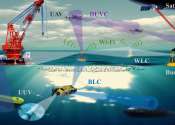Space is the boundless, three-dimensional extent in which objects and events occur and have relative position and direction. Physical space is often conceived in three linear dimensions, although modern physicists usually consider it, with time, to be part of the boundless four-dimensional continuum known as spacetime. In mathematics spaces with different numbers of dimensions and with different underlying structures can be examined. The concept of space is considered to be of fundamental importance to an understanding of the universe although disagreement continues between philosophers over whether it is itself an entity, a relationship between entities, or part of a conceptual framework.
Many of the philosophical questions arose in the 17th century, during the early development of classical mechanics. In Isaac Newton's view, space was absolute - in the sense that it existed permanently and independently of whether there were any matter in the space. Other natural philosophers, notably Gottfried Leibniz, thought instead that space was a collection of relations between objects, given by their distance and direction from one another. In the 18th century, Immanuel Kant described space and time as elements of a systematic framework which humans use to structure their experience.
In the 19th and 20th centuries mathematicians began to examine non-Euclidean geometries, in which space can be said to be curved, rather than flat. According to Albert Einstein's theory of general relativity, space around gravitational fields deviates from Euclidean space. Experimental tests of general relativity have confirmed that non-Euclidean space provides a better model for explaining the existing laws of mechanics and optics.









